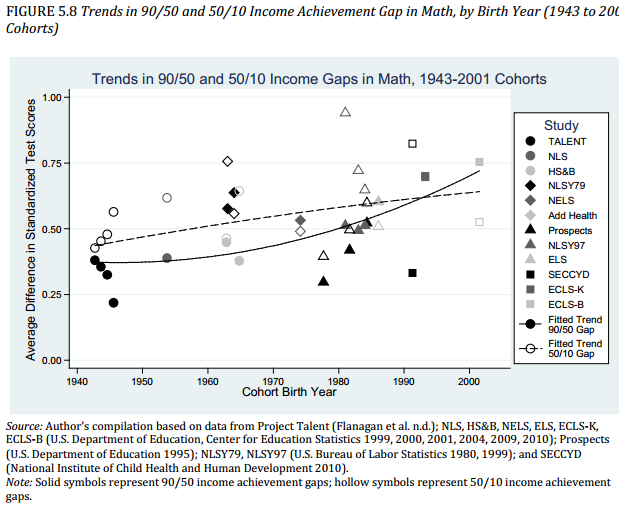Are the Poor Left Behind Or Are the Rich Simply Pulling Ahead? Part 2
A post in this blog more than three years ago bears the same title, "Are the Poor Left Behind Or Are the Rich Simply Pulling Ahead?" It shows a correlation between income and achievement gaps. Children from poor families struggle academically. A recent study by Kalil and coworkers suggests that this is so much more than just a simple correlation. It is very likely a "cause and effect" relationship. Affluent families are simply providing more engaging and enriching activities to their young children. Consequently, these children enter kindergarten much more prepared than those coming from poor families.
The previous post talks about Reardon's "The widening academic achievement gap between the rich and the poor: New evidence and possible explanations". Figures from this paper that tell the story are as follows:
The previous post talks about Reardon's "The widening academic achievement gap between the rich and the poor: New evidence and possible explanations". Figures from this paper that tell the story are as follows:
The academic gap is widening because rich students are increasingly entering kindergarten much better prepared to succeed in school than middle-class students. This difference in preparation persists through elementary and high school.Providing cognitive enriching activities to young children can definitely make the difference and the recent study published in the American Educational Research Association journal shows that indeed, there is an income gap associated with these activities:
Not only are the gaps stable over time but some are in fact rising a bit over time. What is further disconcerting is when the actual amount is examined, not just the gaps. Kalil and coworkers write, "Specifically, in 1988, an estimated 33%, 22%, and 15% of the 90th, 50th, and 10th percentiles read daily to their children, whereas in 2012, 62%, 43%, and 32% did so." It seems like parenting is now becoming a race to give further advantage to their children. Although poor families reading to their children daily have doubled from 1988 to 2012, wealthy families have done the same thing, clearly ratcheting up the competition. This does sound gloomy as we are becoming more and more competitive so I will close this post with a astatement I made in the previous post years ago. It is somewhat positive:
"The data presented are actually promising in the sense that these provide proof that helping children prepare for school is possible. The wealthy is able to do it."




Comments
Post a Comment